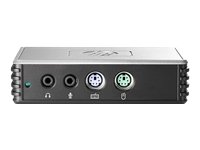


The HP MultiSeat t100 Zero Client, part number QS971AA, is a compact device designed for multi-user computing systems. As a zero client, it lacks an onboard CPU, meaning all computing power is delivered directly from a centralised host, making it ideal for environments requiring simplified, low-maintenance devices. This model supports multiple computing sessions through a single host PC, providing efficient resource sharing without the need for individual desktops at each user station.
The device itself has no internal storage or processing unit, which not only reduces power consumption but also minimises associated hardware costs. With its simple plug-and-play set-up, system administrators can install and configure the t100 Zero Client with ease, reducing the time and complexity involved in provisioning traditional workstations. The device connects to the host system via USB and outputs video, audio, as well as peripheral data such as keyboard and mouse input, making it a completely stateless terminal.
This zero client model allows access to full computing environments through the corresponding host PC, taking advantage of the compute, storage, and network infrastructure it is connected to. It also supports typical office applications, improving efficiency in classrooms, call centres, or training environments, where centralised management is key. Its small form factor also makes it space-saving, fitting easily on desktop setups without clutter.
The HP MultiSeat t100 Zero Client ensures users can benefit from computing capabilities at a fraction of the cost of traditional PCs, making it a favourable choice for businesses or institutions looking to deploy a high number of workstations on a budget, with minimal hardware in each space.
EOL Technology Services offers professional repair support, assistance, and replacement parts for the HP MultiSeat t100 Zero Client. Whether maintaining existing systems or sourcing components, our services ensure that you're equipped to keep your systems operational and efficient well beyond their typical lifecycle.
We can ship to most places in the world, but due to regulations and laws there are some countries we cannot ship to. Please contact a member of the team for clarification based on your location.
Depending on the age and condition of the server, some may still have a manufacturer warranty. If not we can offer a 30 day RTB warranty with optional extended support packages, including 24/7 technical assistance, hardware maintenance, and on-site repairs if needed.
Absolutely! We provide a range of professional services that allow your to expand your existing infrastructure seamlessly. From upgrading existing servers, site relocations to installing replacement parts.
Our team conducts a detailed consultation to understand your business objectives, workload requirements, and budget. Based on this, we can either recommend, or offer an alternative part.
We offer a huge range of servers not listed on our website, including rack, tower, and blade servers, from many leading brands and vendors. Our servers can also be fully customised to meet your specific needs, including CPU, RAM, hard disk or similar expansion options. Give us a call or send us a message and one of our team will get back to you!